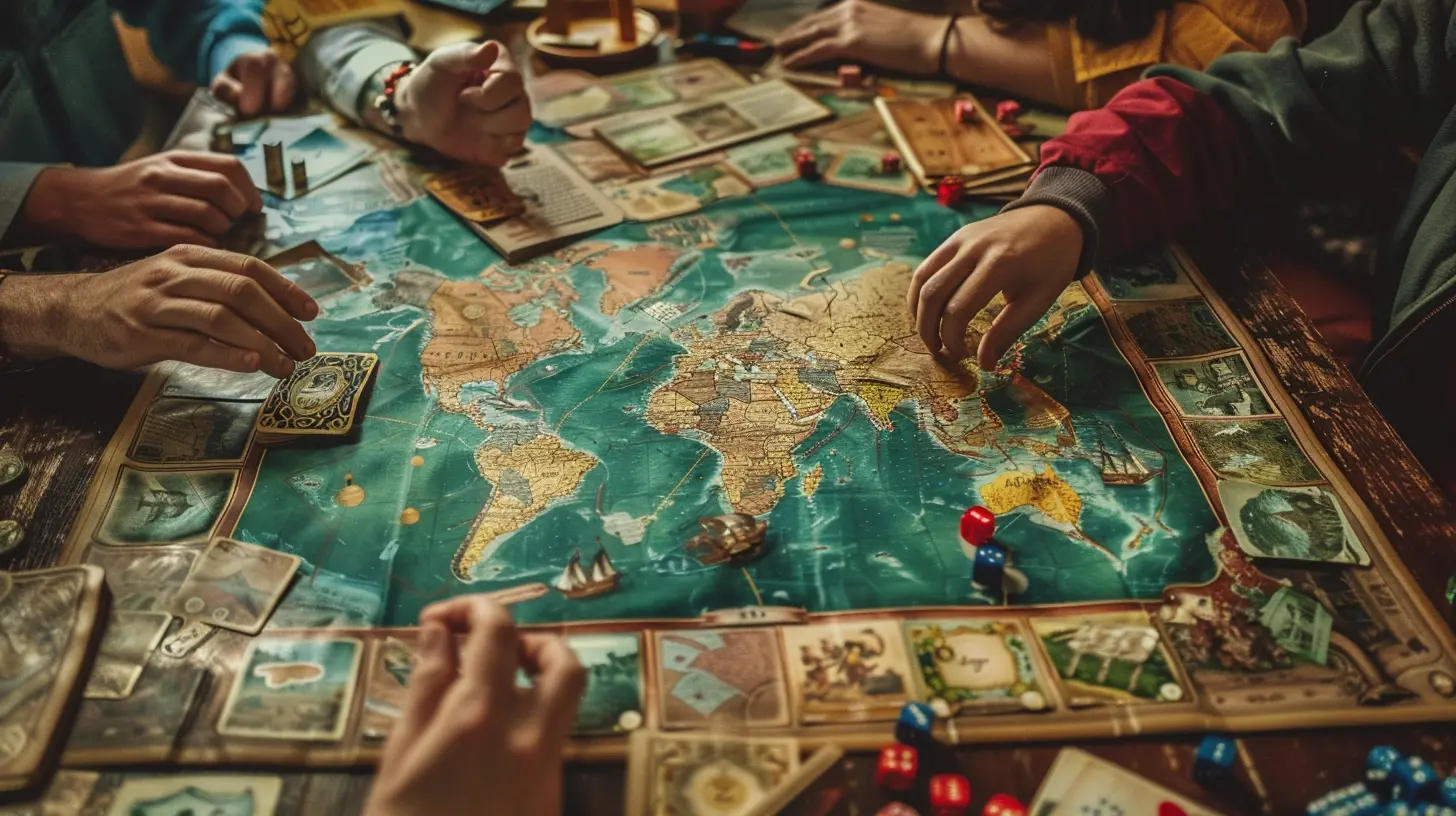Learning Languages Through Immersive Game Worlds
29 September 2025
Ever thought about how cool it would be to pick up a new language while slaying dragons, managing a galactic empire, or solving ancient puzzles? Yeah, it sounds like a fantasy, but it’s happening. Gamers all around the world are leveling up their language skills just by doing what they love—gaming.
Thanks to immersive game worlds, learning a language isn't just about memorizing vocab lists or listening to boring audio tapes anymore. It's about stepping into a whole new reality where the language comes alive in context. This isn't your typical classroom setup. This is learning on your own terms, in your own virtual universe.
Let’s dive into this intriguing combo of gaming and language acquisition, and why it might just be the smartest (and coolest) way to go multilingual.
Why Games Work for Language Learning
Let’s face it: traditional language learning can be a grind. Flashcards, grammar drills, and listening exercises get old—fast. But when you’re playing a game, it doesn’t feel like studying. It’s fun, engaging, fast-paced, and most importantly, it’s real.Here’s what games bring to the table:
- Contextual learning: You’re not just memorizing words; you’re seeing them in action.
- Repetition without boredom: Games naturally repeat words and phrases, reinforcing them without you even realizing it.
- Emotional engagement: When you're invested in a character or story, you're more likely to remember the words associated with them.
- Instant feedback: Choose the wrong dialogue option? You’ll get corrected quickly (and probably hilariously).
- Social interaction: Many games have international fanbases and multiplayer functions. Language practice is just part of the ride.
Types of Games That Are Goldmines for Language Learning
Not all games are created equal when it comes to language learning. Some offer better immersion and language exposure than others. Here are the MVPs:1. Role-Playing Games (RPGs)
Think: The Witcher, Final Fantasy, Skyrim.RPGs have rich storylines, tons of dialogue, and a boatload of reading material. Whether it's character conversations, quest instructions, or item descriptions, you’re exposed to language constantly. Better yet, many of these games allow players to change the game’s language settings. Want to play Skyrim in Spanish? Go for it.
These games are great for learning because they mix dialogue, action commands, and lots of text—all in context. You’re not just reading — you’re living the language.
2. Visual Novels and Story-Driven Games
Think: Doki Doki Literature Club, Life is Strange, Phoenix Wright.These are ideal for learners who prefer reading and narrative. With minimal action and maximum conversation, these games play out like interactive books. You make choices that affect the storyline, so you're not just passively consuming content; you're engaging with it.
And the language? It's day-to-day stuff. Think casual conversations, slang, idioms, and even sarcasm—everything textbooks often skip.
3. MMORPGs (Massively Multiplayer Online Role-Playing Games)
Think: World of Warcraft, Final Fantasy XIV, Elder Scrolls Online.These games toss you into a world full of real players from every corner of the globe. You’ll be chatting, trading, strategizing, and forming alliances—all while navigating a second language.
Even if you’re not actively chatting with others, these games usually have tons of quests and lore to work through. And with many global servers, you can also switch your game client’s language and jump into another country’s community.
4. Puzzle and Logic Games
Think: The Witness, Professor Layton, Portal.These games may use less dialogue, but they help reinforce command words, instructions, and logical connectors. If you're learning how to follow directions or process commands in a second language, this style of gameplay can help sharpen those skills.
How to Maximize Language Learning in Games
Now, before you go downloading every RPG out there in Japanese, hang on. To actually grow your language skills through gaming, you have to be intentional. Here are some solid strategies:1. Set Your Game Language Based on Your Skill Level
If you're just starting out, pick a game with dual subtitles (like English and your target language). As you get better, try switching the audio or interface language.2. Use Games You Already Know
If you've played The Legend of Zelda: Breath of the Wild in English, try playing it in French next time. You already know what’s going on, so your brain will fill in the gaps naturally when you're uncertain about certain phrases or words.3. Take Notes Like a Gamer-Scholar
Keep a notebook (or an app like Notion) nearby. Jot down phrases or words you don’t understand. Look them up later—or even better, use them when chatting online with other players.4. Join Language-Specific Servers or Forums
Are you learning German? Try joining a German-speaking guild in an MMO. You’ll learn how people actually speak, not just textbook grammar.5. Use Mods and Fan Translations
Enthusiastic gamers often translate games into various languages or create mods that add subtitles, improve translations, or even voiceovers. Tap into this community-generated wisdom.
Real-World Examples of Gamers Learning Languages
Don’t just take my word for it—there are thousands of stories out there from gamers who picked up Japanese from playing Persona, or who improved their English through Minecraft servers.Take Alex, a 25-year-old from Brazil. He wanted to learn English, found Duolingo boring, and eventually got hooked on The Elder Scrolls V: Skyrim. After 200+ hours in the game (with subtitles on and dictionary at hand), he says he can now confidently handle English conversations and even writes decent emails at work.
Or how about Miki, a Japanese student who learned conversational Spanish by playing The Sims 4 daily—with Spanish audio and subtitles turned on. The game’s daily-life vocabulary helped her force herself to make connections between actions and their words.
The Science Behind It
Still skeptical? There’s research backing all this up.Studies show that immersive environments—like game worlds—stimulate more parts of the brain than passive learning. You’re not just memorizing; you’re problem-solving, interacting, and associating visuals with language in real time. That’s deep learning.
Gamification also enhances motivation. You’re not learning because someone told you to. You’re doing it because the game needs you to understand what to do, or else your beautiful, meticulously crafted character might just get eaten by trolls.
The Best Languages to Learn Through Games
So which languages are best served through gaming immersion?- English: Virtually every game has an English version. This is the common denominator.
- Japanese: Many popular games are Japanese-created, so you’ll often find content in Japanese and even cultural references.
- Spanish, French, and German: Most AAA games and many indies offer translations or voiceovers in these languages.
- Korean and Chinese: These are becoming more common, especially with the rise of Asian-developed titles and mobile gaming.
Game Recommendations by Language
Here’s a quick cheat sheet of awesome games to try, by language:| Language | Game Titles |
|----------|-------------|
| Japanese | Persona 5, Pokémon, Fire Emblem, Final Fantasy series |
| Spanish | Assassin’s Creed series, FIFA, The Sims, Uncharted |
| French | Life is Strange (made by a French studio), Rayman, Beyond: Two Souls |
| German | Gothic series, Anno 1800, The Witcher (language toggle available) |
| English | Pretty much every game ever |
| Korean | Black Desert Online, Lost Ark |
| Chinese | Genshin Impact, Chinese Paladin |
Challenges to Watch Out For
Of course, it’s not all pixel-perfect. Learning languages through games has its own quirks:- Game language can be archaic or unrealistic: RPGs often have medieval or fantasy dialects.
- Slang and informal speech: Can be super useful—or super confusing.
- Translational inconsistencies: Not all translations are faithful or grammatically correct.
- Requires patience: You won’t become fluent overnight. But with consistency? You’ll get there.
Final Thoughts
If you're already gaming in your free time (and let's be honest, who isn’t?), turning it into a language-learning opportunity is just plain smart. You’re making use of something you already love, and turning it into a powerful educational tool.Gaming isn’t just about escaping reality—it can be a doorway into other cultures, new vocabularies, and even fresh social circles. So the next time someone tells you to quit wasting time playing video games, you’ve got the perfect excuse. You're not wasting time—you’re studying.
And hey, if you can save a kingdom or solve a murder mystery in your target language, what can’t you do?
all images in this post were generated using AI tools
Category:
Educational GamesAuthor:

Stephanie Abbott
Discussion
rate this article
1 comments
Luma Newton
Love this idea! Games make learning languages so much fun!
September 30, 2025 at 5:04 PM

Stephanie Abbott
Thank you! I'm glad you think so. Games truly enhance the language learning experience!


